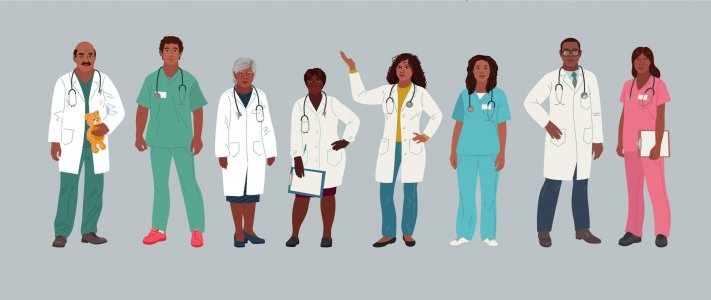Outreach to BIPOC communities has always been a challenge in ME/CFS. In a disease where diagnosis is so hard to come by, who gets a diagnosis is not a matter of prevalence but a matter of privilege. While community-based studies show just as many Black people get ME as white people, if not more, white people may receive a diagnosis after years or even decades of trying: Black people with ME may not receive a diagnosis at all.
#MEAction’s Postcards to Doctors initiative asks volunteers to reach out to doctors near their zip code to encourage them to participate in medical education for ME/CFS. However, we knew that if we solely ran the initiative through diagnosed patients and their families, we would likely end up reaching out to solely white neighborhoods. Therefore, we ensured that participants sent postcards to areas in their home states with diverse populations as well as to their own zip codes.
In the late spring and early summer of 2020, #MEAction began to plan its first clinical seminar. Working with Drs. Bateman, Rowe, and VanNess, we crafted a message about how COVID-19 would likely give rise to many more cases of ME/CFS. At the same time, news of the disproportionate effect of COVID-19 on BIPOC populations implied that a disproportionate number of post-COVID ME/CFS patients would be in minoritized populations.
In July 2020, members of our ME community came together to reach out to clinicians who serve BIPOC communities. I stated that I was (and remain) very happy to step down or aside in the future if someone who was part of the Black, Latinx, or Indigenous community would like to lead. However, my stance is that white people have to act to close the gap in patient care as well, especially in our community where so few of us are healthy enough to advocate over the long haul. We started by identifying BIPOC health organizations for outreach and used attending our clinical seminar on ME and long COVID as our targeted ask.
It was slow going. We met with a number of people and groups that led us to dead ends. As a group, we learned a lot about outreach, leveraging social media and pre-existing contacts, and adding people to #MEAction’s clinician mailing list to keep everybody connected. We crafted email scripts and follow-up email scripts and sent word to dozens of organizations.
Clinicians from these organizations did attend the seminar and did ask their friends and colleagues to join them. But we continued to press on in search of closer collaborations.
We leveraged #MEAction’s clinician’s mailing list to keep the clinical community we had built engaged and invested, and asked for their ideas. It’s often after making an offering to the community that you are in a position to receive.
Through our engagement:
- Our long COVID talking points were used by health equity expert Dr. Ron Wyatt in presentations to Yale, Columbia, Cornell, and University of Rochester.
- We met with Tshaka Cunningham, a professor in microbiology with interest in virology and neurodegenerative disease to plan medical education at Morehouse and Howard, two traditionally Black medical colleges.
- We engaged with Dr. Sonak Pastakia, an expert in patient engagement in HIV in Africa, interested in piloting the same thing patient-to-patient and clinician-to-clinician for ME/CFS.
Over the course of our outreach we also made connections that make a difference for all of our community, including with Project ECHO, a clinical distance learning project that helps clinicians in rural and underserved areas learn from disease experts; the clinical education coordinator at Brown in Family Medicine, which has led to a scheduled talk on ME and long COVID; and the Society to Improve Diagnosis in Medicine, which looks as though it will become two talks this fall, one for patients and one for medical providers.
I can’t emphasize enough that this work could not have been done without our volunteers and without their commitment and persistence. We began with cold calling and we move forward today with a community of engaged partners on multiple projects. By putting in the work, we hope to move further down the long road to equity.
We encourage readers of the article who know medical professionals serving BIPOC communities who would be interested in helping spread the word about ME/CFS and other chronic complex diseases to reach out to us at [email protected].
Our members:
- Jaime Seltzer, Director of Scientific and Medical Outreach, #MEAction
- Erin Roediger, US Advocacy Manager, #MEAction
- Wilhelmina Jenkins, #MEAction GA
- Ashanti Daniel, California
- Bobbi Ausubel, #MEAction CA
- Layla Cervantes, California





